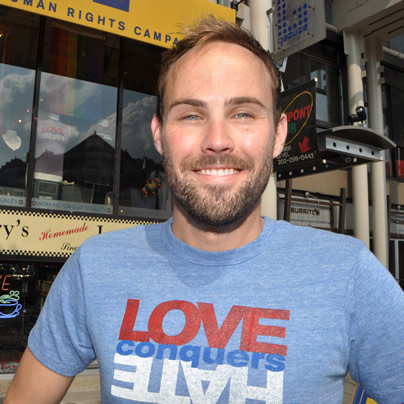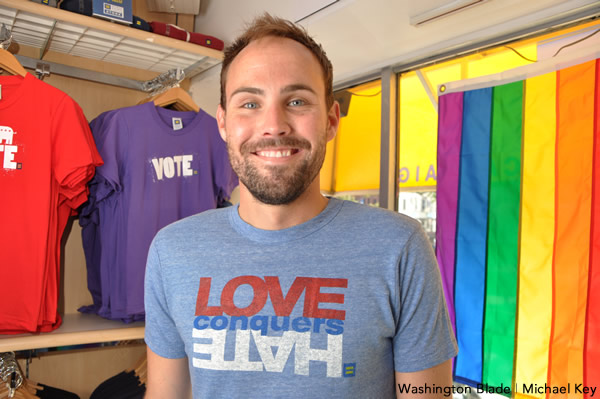Arts & Entertainment
Queery: Bryce Romero
HRC consumer marketing specialist answers our 20 gay questions


Romero is single and lives in Columbia Heights. He enjoys reading, music, travel, food and shopping in his free time. (Blade photo by Michael Key)
Bryce Romero has an interesting spin on the merchandise that his employer — the Human Rights Campaign — hawks at its three shops (in Washington, Provincetown and San Francisco, the latter in Harvey Milk’s old Castro-based camera shop). In gay hubs, the T-shirts and stickers are a way to show LGBT support but elsewhere, the yellow-and-navy equal logos are sometimes a way for gays to be out to each other without necessarily being out to anyone else.
“In some cases, it’s like the secret handshake,” the 28-year-old Scottsdale, Ariz., native says. “Some people don’t have the liberty of being in a place like D.C. where it’s OK to be openly gay. In a number of places in the Midwest and in the South, wearing your HRC merchandise is a way of identifying yourself without being identifiable.”
Romero is HRC’s consumer marketing assistant and works at the agency’s main office in Washington where he’s lived for just more than a year. He guesses the group takes in about a million dollars each year in merchandise, the profits of which go back to the organization. In addition to the usual sweatshirts and key chains, the company sometimes makes collectible items such as Christopher Radko Christmas tree ornaments and Kenneth Cole-designed shirts.
His work with HRC — a bit different than what he studied getting an undergraduate degree in PR/advertising and a master’s in international communications — is a way to help the organization continue its work.
“I have an underlying passion for global change and effecting change and moving momentum forward,” he says.
How long have you been out and who was the hardest person to tell?
I’ve never been unofficially out of the closet. At the age of 5-6, I was already sporting Billy Idol hair and wearing the child equivalent of sorts. Officially, I’ve been out since about the age of 14. The most difficult person to tell was probably my college roommates in Texas. There’s always a bit of fear telling that to someone with whom you’re going to be sharing close quarters particularly at a Christian university in Texas.
Who’s your LGBT hero?
Do I have to pick just one? Truthfully, I’m inspired each and every day by our interns and those LGBT folk younger than me who wholeheartedly live their lives openly and honestly. Also, Sylvester because he worked those sequined dresses like a true DIVA!
What’s Washington’s best nightspot, past or present?
Cobalt? Anywhere on 17th Street to be honest as I always know I’ll run into a friend.
Describe your dream wedding.
It’d be an elegant sunset wedding surrounded by friends, family and loved ones in one of my absolute favorite places in the world— the Masai Mara National Reserve in Kenya. There’s something uniquely special and incredibly magical about the game reserve — I couldn’t imagine getting married anywhere else.
What non-LGBT issue are you most passionate about?
Well I’m pretty much a professional homosexual so there’s not much time for much else, however I’ve got a huge soft spot for animals.
What historical outcome would you change?
Having just finished a book about James Garfield, I started thinking about this yesterday! Truthfully, history happens and changing it seems inauthentic to our progress as people.
What’s been the most memorable pop culture moment of your lifetime?
Ellen DeGeneres’ coming out. It’s terribly cliché but, to me, it put America on its current trajectory toward greater acceptance of LGBT Americans as well as starting a conversation about equality. That’s pretty damn cool.
On what do you insist?
Laughter, smiles and congeniality.
What was your last Facebook post or Tweet?
FB: “Bryce Romero would marry the night but there’s no morning-after pill.”
Twitter: “Link to the BuzzFeed picture of Hillary Clinton … and turn and work and serve hunnny”
If your life were a book, what would the title be?
“What Color Should I Wear To Bed?”
If science discovered a way to change sexual orientation, what would you do?
Heck no, I wouldn’t change. Somebody has to bring the glitter to the party.
What do you believe in beyond the physical world?
Oh I’m totally a firm believer in the paranormal and spirits.
What’s your advice for LGBT movement leaders?
Don’t compromise but compromise. This isn’t a you-or-me issue but rather a you and me issue.
What would you walk across hot coals for?
A half-full glass of water. Or for the ability to keep my mother alive for as long as I live.
What LGBT stereotype annoys you most?
We’re liberal in all facets of our life.
What’s your favorite LGBT movie?
“Paris Is Burning” with “Prayers for Bobby” coming a very close second.
What’s the most overrated social custom?
Beating around the bush — just get to the point. Patience is not a virtue I’ve been known to possess — ever.
What trophy or prize do you most covet?
If I have to go to a black-tie reception to collect the trophy or prize, I wouldn’t want it. So maybe a “World’s Best Friend” award?
What do you wish you’d known at 18?
How to drive, how to love and how to shake off the past.
Why Washington?
Certainly not the weather, that’s for sure! There’s nowhere else quite like the swamp and I would be hard pressed to trade the passionate people, vibrant nightlife, cultural amenities and cheap booze for anywhere else. All kidding aside, Washington really embodies that notion of a cosmopolitan city — it’s everything!

Friday, January 9
Women in Their Twenties and Thirties will be at 8 p.m. on Zoom. This is a social discussion group for queer women in the Washington, D.C. area. For more details, visit Facebook.
“Backbone Comedy” will be at 8 p.m. at As You Are. Backbone Comedy is a queer-run fundraiser comedy show at As You Are Bar DC, where comics stand up for a cause. Each show, a percentage of proceeds go to a local organization – Free Minds DC, a reentry organization for individuals impacted by incarceration. Tickets cost $19.98 and are available on Eventbrite.
Saturday, January 10
Go Gay DC will host “LGBTQ+ Community Brunch” at 11 a.m. at Freddie’s Beach Bar & Restaurant. This fun weekly event brings the DMV area LGBTQ+ community, including allies, together for delicious food and conversation. Attendance is free and more details are available on Eventbrite.
Monday, January 12
“Center Aging: Monday Coffee Klatch” will be at 10 a.m. on Zoom. This is a social hour for older LGBTQ+ adults. Guests are encouraged to bring a beverage of choice. For more information, contact Adam ([email protected]).
Genderqueer DC will be at 7 p.m. on Zoom. This is a support group for people who identify outside of the gender binary, whether you’re bigender, agender, genderfluid, or just know that you’re not 100% cis. For more details, visit genderqueerdc.org or Facebook.
Tuesday, January 13
Coming Out Discussion Group will be at 7 p.m. on Zoom. This is a safe space to share experiences about coming out and discuss topics as it relates to doing so — by sharing struggles and victories the group allows those newly coming out and who have been out for a while to learn from others. For more details, visit the group’s Facebook.
Trans Discussion Group will be at 7 p.m. on Zoom. This group is intended to provide an emotionally and physically safe space for trans people and those who may be questioning their gender identity/expression to join together in community and learn from one another. For more details, email [email protected].
Wednesday, January 14
Job Club will be at 6 p.m. on Zoom upon request. This is a weekly job support program to help job entrants and seekers, including the long-term unemployed, improve self-confidence, motivation, resilience and productivity for effective job searches and networking — allowing participants to move away from being merely “applicants” toward being “candidates.” For more information, email [email protected] or visit thedccenter.org/careers.
The DC Center for the LGBT Community will partner with House of Ruth to host “Art & Conversation” at 3 p.m. at 1827 Wiltberger St., N.W. This free workshop will involve two hours of art making, conversation, and community. Guests will explore elements of healthy relationships with a community-centered art activity. This workshop involves paint, so please dress accordingly. All materials will be provided. For more details, email [email protected].
Thursday, January 15
The DC Center’s Fresh Produce Program will be held all day at the DC Center for the LGBT Community. People will be informed on Wednesday at 5 p.m. if they are picked to receive a produce box. No proof of residency or income is required. For more information, email [email protected] or call 202-682-2245.
Virtual Yoga Class will be at 7 p.m. on Zoom. This free weekly class is a combination of yoga, breathwork and meditation that allows LGBTQ+ community members to continue their healing journey with somatic and mindfulness practices. For more details, visit the DC Center’s website.
Movies
‘Hedda’ brings queer visibility to Golden Globes
Tessa Thompson up for Best Actress for new take on Ibsen classic

The 83rd annual Golden Globes awards are set for Sunday (CBS, 8 p.m. EST). One of the many bright spots this awards season is “Hedda,” a unique LGBTQ version of the classic Henrik Ibsen story, “Hedda Gabler,” starring powerhouses Nina Hoss, Tessa Thompson and Imogen Poots. A modern reinterpretation of a timeless story, the film and its cast have already received several nominations this awards season, including a Globes nod for Best Actress for Thompson.
Writer/director Nia DaCosta was fascinated by Ibsen’s play and the enigmatic character of the deeply complex Hedda, who in the original, is stuck in a marriage she doesn’t want, and still is drawn to her former lover, Eilert.
But in DaCosta’s adaptation, there’s a fundamental difference: Eilert is being played by Hoss, and is now named Eileen.
“That name change adds this element of queerness to the story as well,” said DaCosta at a recent Golden Globes press event. “And although some people read the original play as Hedda being queer, which I find interesting, which I didn’t necessarily…it was a side effect in my movie that everyone was queer once I changed Eilert to a woman.”
She added: “But it still, for me, stayed true to the original because I was staying true to all the themes and the feelings and the sort of muckiness that I love so much about the original work.”
Thompson, who is bisexual, enjoyed playing this new version of Hedda, noting that the queer love storyline gave the film “a whole lot of knockoff effects.”
“But I think more than that, I think fundamentally something that it does is give Hedda a real foil. Another woman who’s in the world who’s making very different choices. And I think this is a film that wants to explore that piece more than Ibsen’s.”
DaCosta making it a queer story “made that kind of jump off the page and get under my skin in a way that felt really immediate,” Thompson acknowledged.
“It wants to explore sort of pathways to personhood and gaining sort of agency over one’s life. In the original piece, you have Hedda saying, ‘for once, I want to be in control of a man’s destiny,’” said Thompson.
“And I think in our piece, you see a woman struggling with trying to be in control of her own. And I thought that sort of mind, what is in the original material, but made it just, for me, make sense as a modern woman now.”
It is because of Hedda’s jealousy and envy of Eileen and her new girlfriend (Poots) that we see the character make impulsive moves.
“I think to a modern sensibility, the idea of a woman being quite jealous of another woman and acting out on that is really something that there’s not a lot of patience or grace for that in the world that we live in now,” said Thompson.
“Which I appreciate. But I do think there is something really generative. What I discovered with playing Hedda is, if it’s not left unchecked, there’s something very generative about feelings like envy and jealousy, because they point us in the direction of self. They help us understand the kind of lives that we want to live.”
Hoss actually played Hedda on stage in Berlin for several years previously.
“When I read the script, I was so surprised and mesmerized by what this decision did that there’s an Eileen instead of an Ejlert Lovborg,” said Hoss. “I was so drawn to this woman immediately.”
The deep love that is still there between Hedda and Eileen was immediately evident, as soon as the characters meet onscreen.
“If she is able to have this emotion with Eileen’s eyes, I think she isn’t yet because she doesn’t want to be vulnerable,” said Hoss. “So she doesn’t allow herself to feel that because then she could get hurt. And that’s something Eileen never got through to. So that’s the deep sadness within Eileen that she couldn’t make her feel the love, but at least these two when they meet, you feel like, ‘Oh my God, it’s not yet done with those two.’’’
Onscreen and offscreen, Thompson and Hoss loved working with each other.
“She did such great, strong choices…I looked at her transforming, which was somewhat mesmerizing, and she was really dangerous,” Hoss enthused. “It’s like when she was Hedda, I was a little bit like, but on the other hand, of course, fascinated. And that’s the thing that these humans have that are slightly dangerous. They’re also very fascinating.”
Hoss said that’s what drew Eileen to Hedda.
“I think both women want to change each other, but actually how they are is what attracts them to each other. And they’re very complimentary in that sense. So they would make up a great couple, I would believe. But the way they are right now, they’re just not good for each other. So in a way, that’s what we were talking about. I think we thought, ‘well, the background story must have been something like a chaotic, wonderful, just exploring for the first time, being in love, being out of society, doing something slightly dangerous, hidden, and then not so hidden because they would enter the Bohemian world where it was kind of okay to be queer and to celebrate yourself and to explore it.’”
But up to a certain point, because Eileen started working and was really after, ‘This is what I want to do. I want to publish, I want to become someone in the academic world,’” noted Hoss.
Poots has had her hands full playing Eileen’s love interest as she also starred in the complicated drama, “The Chronology of Water” (based on the memoir by Lydia Yuknavitch and directed by queer actress Kristen Stewart).
“Because the character in ‘Hedda’ is the only person in that triptych of women who’s acting on her impulses, despite the fact she’s incredibly, seemingly fragile, she’s the only one who has the ability to move through cowardice,” Poots acknowledged. “And that’s an interesting thing.”
Arts & Entertainment
2026 Most Eligible LGBTQ Singles nominations
We are looking for the most eligible LGBTQ singles in the Washington, D.C. region.

Are you or a friend looking to find a little love in 2026? We are looking for the most eligible LGBTQ singles in the Washington, D.C. region. Nominate you or your friends until January 23rd using the form below or by clicking HERE.
Our most eligible singles will be announced online in February. View our 2025 singles HERE.
-

 National4 days ago
National4 days agoWhat to watch for in 2026: midterms, Supreme Court, and more
-

 District of Columbia5 days ago
District of Columbia5 days agoTwo pioneering gay journalists to speak at Thursday event
-

 Colombia4 days ago
Colombia4 days agoBlade travels to Colombia after U.S. forces seize Maduro in Venezuela
-

 a&e features5 days ago
a&e features5 days agoQueer highlights of the 2026 Critics Choice Awards: Aunt Gladys, that ‘Heated Rivalry’ shoutout and more


















